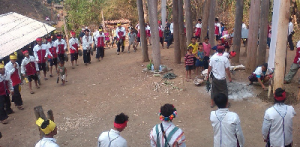
The Karenni people have many different cultural traits and beliefs. Karenni is a broader term used to describe all of the sub-ethnic groups that comprise it. Their beliefs are dependent on their sub-ethnic group.
There are 8 main sub-ethnic groups: Kayah, Gekho, Gayba, Kayan, Manu Mano, Yintalae, Yinbaw and Payae. The Karenni are not just diverse in ethnicity. As a group, they also have different traditions and religions.
The main religion of Karenni people is Christianity (Including various denominations). In addition to Christianity, there is also a minority Buddhist population. The third main religion is the traditional Animist belief. Some Karenni people only believe in their Animist traditions. Other Karenni people hold on to their Animist traditions and also follow other religions.
The Animist traditions of Karenni people are centered on serving and protecting their community. They are separated into two main groups; the Ee-Lu-Phu and the Khai-phu. The Ee-Lu-Phu has responsibility for leading rituals and worship to their gods and spirits. The Khai-Phu has the responsibility of feeding the souls that guard the environment (Mountains, forests and rivers). They must also lead the festivals.
Traditionally, the Khai-Phu and Ee-Lu-Phu have held relatively distinct roles in Karenni culture. In traditional culture, Karenni people are not allowed to marry outside of their society. Each society must also select a chief for their village. There will be a chief for the Ee-Lu-Pu and a chief for the Khai-Pu. These chiefs must follow strict rules as part of their leadership responsibilities.
As part of their leadership responsibilities, the chiefs must avoid certain meats. The Ee-Lu-Phu chief also has different responsibilities for each of the three annual Ee-Lu festivals. The most important festival for Karenni people is the Pole festival. It is also known as Kay Htoe Boe festival and is for all Karenni people.
The main festival of Kay Htoe Boe reflects the story of how the Earth came into being. Every year, Karenni people must erect a pole to protect their health. This pole is erected on behalf of an order from their goddess. In order to maintain their health, people must dance around the pole and make musical sounds with their body.
SDC considers the preservation and dissemination of our cultural practices and ideas a key part of our vision for a free and democratic society. All Karenni people must have freedom of religion and freedom of expression.
